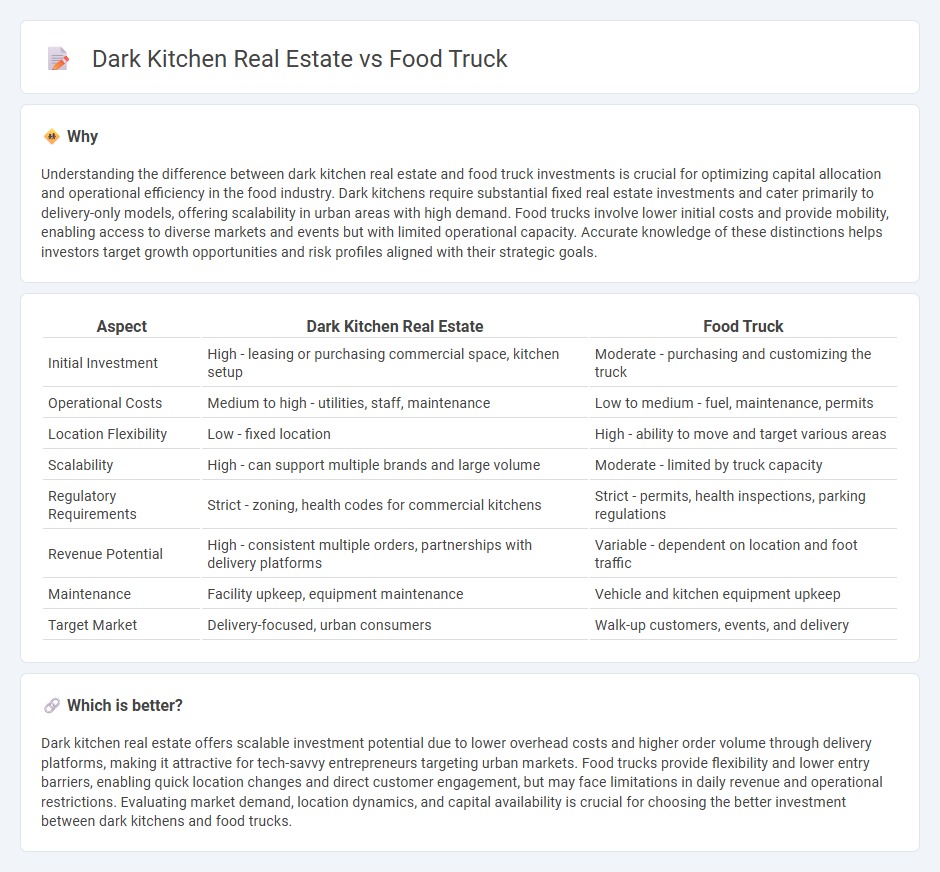
Dark kitchen real estate offers investors a scalable and stable asset with growing demand driven by the expanding delivery-only food market. Food trucks provide lower entry costs and mobility, appealing to entrepreneurs seeking flexibility but facing operational challenges and limited physical presence. Explore the distinct investment opportunities and risks between dark kitchens and food trucks to make informed decisions.
Why it is important
Understanding the difference between dark kitchen real estate and food truck investments is crucial for optimizing capital allocation and operational efficiency in the food industry. Dark kitchens require substantial fixed real estate investments and cater primarily to delivery-only models, offering scalability in urban areas with high demand. Food trucks involve lower initial costs and provide mobility, enabling access to diverse markets and events but with limited operational capacity. Accurate knowledge of these distinctions helps investors target growth opportunities and risk profiles aligned with their strategic goals.
Comparison Table
| Aspect | Dark Kitchen Real Estate | Food Truck |
|---|---|---|
| Initial Investment | High - leasing or purchasing commercial space, kitchen setup | Moderate - purchasing and customizing the truck |
| Operational Costs | Medium to high - utilities, staff, maintenance | Low to medium - fuel, maintenance, permits |
| Location Flexibility | Low - fixed location | High - ability to move and target various areas |
| Scalability | High - can support multiple brands and large volume | Moderate - limited by truck capacity |
| Regulatory Requirements | Strict - zoning, health codes for commercial kitchens | Strict - permits, health inspections, parking regulations |
| Revenue Potential | High - consistent multiple orders, partnerships with delivery platforms | Variable - dependent on location and foot traffic |
| Maintenance | Facility upkeep, equipment maintenance | Vehicle and kitchen equipment upkeep |
| Target Market | Delivery-focused, urban consumers | Walk-up customers, events, and delivery |
Which is better?
Dark kitchen real estate offers scalable investment potential due to lower overhead costs and higher order volume through delivery platforms, making it attractive for tech-savvy entrepreneurs targeting urban markets. Food trucks provide flexibility and lower entry barriers, enabling quick location changes and direct customer engagement, but may face limitations in daily revenue and operational restrictions. Evaluating market demand, location dynamics, and capital availability is crucial for choosing the better investment between dark kitchens and food trucks.
Connection
Dark kitchen real estate and food trucks represent innovative investment opportunities in the evolving food service industry, capitalizing on shifting consumer preferences toward convenience and delivery. Dark kitchens require strategically located real estate to optimize delivery times, while food trucks offer mobility and lower overhead, providing complementary avenues for scalable food ventures. Both sectors attract investors seeking high returns through flexible, tech-driven business models that minimize traditional restaurant costs.
Key Terms
Location Analysis
Food truck operations rely heavily on high-traffic, visible urban locations to attract spontaneous customers, making proximity to business districts, event venues, and nightlife hubs critical for maximizing sales potential. Dark kitchens, by contrast, prioritize low-cost, strategically connected sites near dense residential areas and efficient delivery routes to optimize order fulfillment speed and reduce overhead costs. Explore our detailed location analysis to determine the most lucrative property options for scalable food service ventures.
Lease Agreements
Lease agreements for food trucks often emphasize short-term, flexible parking spots in high-traffic locations, favoring mobility and minimal fixed costs. Dark kitchen leases typically involve longer-term contracts for industrial or commercial kitchen spaces designed for optimized food production and delivery logistics. Explore comprehensive lease strategies to maximize operational efficiency and profitability.
Build-Out Costs
Food truck build-out costs typically range from $50,000 to $150,000, covering vehicle customization, kitchen equipment, and permits, offering mobility and lower initial investment compared to dark kitchens. Dark kitchen build-out expenses generally fall between $100,000 and $300,000, driven by commercial kitchen infrastructure, ventilation systems, and technology integration for delivery optimization. Explore detailed cost breakdowns and strategic considerations to optimize your food service real estate investment.
Source and External Links
5280 Food Truck - Denver - A food truck delivering the experience of 5280 Burger Bar, ideal for events like weddings and corporate gatherings, serving Denver's best burgers and ice cream.
Littleton Food Trucks - Full-service food truck catering options in Littleton, CO, featuring specialty trucks like Mac 'N Noodles (gourmet mac and cheese), The Colorado Pig Rig (pork BBQ), The Burger Bus, and The Walking Taco.
Food Truck Avenue - America's premier food truck catering and event planning service with over 20 years of experience, offering a wide variety of food truck concepts to customize for any event.
 dowidth.com
dowidth.com